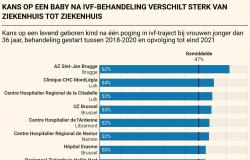Today the National Security Council is meeting to discuss the fight against disinformation during an important election year. The meeting is chaired by Prime Minister Alexander De Croo (Open Vld) and also consists of the members of the core cabinet and the Ministers of the Interior and Defense. The top brass of the Belgian army, State Security and the military intelligence service ADIV will also sit around the table.
ADIV in particular is being looked at to combat foreign disinformation. A Cyber Command was established within the intelligence service last year under the leadership of General Michel Van Strythem. This new cyber service can perhaps best be described as a ‘digital customs officer’. Their specialists monitor online traffic entering and leaving Belgium. It is up to State Security to keep an eye on notable domestic movements.
Ukraine
ADIV already carried out this assignment for the first time during the 2019 elections. Intelligence services worldwide are being woken up by the influence of the American presidential race in 2016. Troll armies controlled from Moscow succeed in playing the Americans against each other online during the campaign. They spread disinformation en masse through fake accounts. For example, conspiracy theories about Hillary Clinton.
No large-scale attacks against Belgium were observed in 2019. Although ‘wasp stings’ have been found. For example, on election day, pro-Russian journalists suddenly report en masse on a modest yellow vest protest in Brussels. Images of the protest are distributed live via Facebook groups, especially to France. European elections are also on the agenda that day in the ‘homeland’ of the yellow vests.
Within the intelligence services it is emphasized that a lot has changed since 2019. The bloody battle in Ukraine, the war in Gaza and tensions with China create a geopolitical situation in which the digital information war is also raging. As host of the European Union and NATO, Belgium is certainly not immune to this. Moreover, our country will remain chairman of the EU until the summer, a strategically important position.
The greatest danger to Belgium comes from Russia, where the state apparatus has a long history of (online) disinformation abroad. Also with us by the way. For example, Russian bots will jump en masse on the political hashtag DeCrooMustGo in 2022. A year later, the controversy surrounding the new French-language sex education curriculum (EVRAS) is used to denounce the ‘moral decay’ of Western society through anonymous accounts. In addition to Russia, China and Iran are particularly adept at online influence.
Rise of AI
A lot has also changed technologically since 2019. The growth of the Russian Telegram, the Chinese TikTok and the takeover of Twitter (now renamed X) by Elon Musk have not made the fight against disinformation any easier. For example, the Belgian intelligence services at X no longer have access to the data behind the social medium.
The rapid rise of AI is another important challenge. This includes the threat of fake photos or videos. Earlier this year, thousands of American Democratic voters suddenly received a call from none other than Joe Biden. In that phone call – with a pre-recorded message – an AI version of the president asks them not to vote. During the recent farmers’ protests in Brussels, AI images have already emerged that stoke farmers’ anger towards agricultural policy.
Tech companies such as Meta, Microsoft, Google and X pledged in February to jointly step up the fight against AI disinformation. The intention is, among other things, to watermark images so that fraud is more quickly noticed. Admittedly, this is a purely symbolic commitment. There is skepticism within the intelligence services: will big tech lose its profits? The stakes are already high. No fewer than 4 billion people worldwide will go to the polls this year. Including in the United States and India.
Tips
In the run-up to the elections, ADIV will meet weekly with specialists from, among others, State Security, the Center for Cyber Security and the Home Affairs government service. The work also continues during the formation of the government. In current affairs, democracy remains vulnerable. If necessary, warnings will be sent to the population via the Crisis Center. It is especially important to warn citizens in the case of blatant disinformation to always check their sources carefully.
Last week, all party leaders in the country were briefed by the intelligence services about the growing digital threat. Not only for themselves or the party headquarters, but also for local candidates. These people are often less familiar with online dangers. A brochure has been prepared with a series of tips for the correct use of passwords and social media.
“Fake news and disinformation via social media pose a threat to our democracy and fall under what we call ‘hybrid warfare’, with the aim of destabilizing our society,” says Defense Minister Ludivine Dedonder (PS). “Our people are working in the shadows to ensure that our elections this year run as smoothly as possible and to detect and neutralize any threat in a timely manner.”
Tags: Belgium preparing tough fight troll armies Russia China Iran
-





